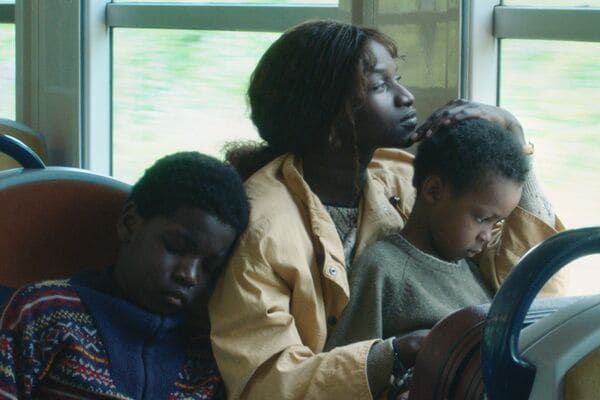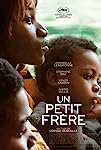Eye For Film >> Movies >> Mother And Son (2022) Film Review
Mother And Son
Reviewed by: Amber Wilkinson

Remember how important the present is because the past can weigh you down and you never know what the future holds could be the message of this film from Léonor Serraille, which delicately considers single motherhood from both the adult perspective and that of the child. Beginning in the late Eighties, it spans 20 years, the focal point passes from mum Rose, first to her elder son Jean and then his younger brother Ernest (played in adulthood by Ahmed Sylla), although these are loose framings of what is, essentially a film less about individualism than the unseen ties that burden and bind us in equal measure.
When we meet them, Rose (Annabelle Lengronne), Jean and Ernest (played as young children by Sidy Fofana and Milan Doucansi) are newly arrived in France from Ivory Coast, living cheek-by-jowl in a room of a relative’s home. Two things are immediately clear. Rose loves her kids with a fierceness and she is equally passionate about living life on her own terms. This includes her love life, which rankles with the relatives who are trying to set her up with the keen but rather serious Julius Caesar (Jean-Christophe Folly).
Lengronne throws herself magnificently into the mercurial but determined Rose, whether she’s embarking on a torrid affair with a builder (Majd Mastoura) working on the hotel opposite where she is a cleaner or dancing when nobody is watching in the middle of the night. One emotion is forbidden, however. “We cry in our heads,” she instructs her boys. This idea of holding in the most destructive of emotions, will echo through the film.
When it comes to herself, Rose lives for the moment, deciding on what appears to be almost a whim to relocate her lads (now played by Stéphane Bak and Kenzo Sambin) to Rouen in order to be nearer to her latest lover Thierry (Thibaut Evrard). Rose’s focus for her boys, however, is firmly on the future, with Jean, as the elder child, under particular pressure to excel academically. After the move to Rouen, Jean also finds himself in a quasi-parental role, as Rose returns to Paris to work and Thierry is largely absent.
Although Jean is succeeding at school and, on the surface of it, society, Serraille articulates the way the pressures brought to bear on him cause cracks to begin to show. Ernest, too, suffers from the trickle-down effect of expectation, with Jean the one who drills his little brother to succeed. Serraille’s film works well as a triptych not just of family members but their approach to time, from Rose’s carpe diem existence, through Jean’s damaging focus on the future, to Ernest, who perhaps best manages to reconcile both of these with the past.
Tears are shed only privately in Serraille’s film but the emotions burn bright. Rose may not be the perfect mother but we see that she is often there unexpectedly when they need it. Serraille shows that this sort of support, which also extends to the relationship between the brothers, is also not necessarily just about hugging - it’s about letting someone in out of the rain, or laying a hand on a shoulder when they need it.
Serraille captures life’s wild extravagances but also makes visible those moments of internal turbulence that family members often suppress for one reason or another. While not dwelling on the subject of migrant families, she also shows in one or two well-placed scenes, the micro-agressions and over-scrutiny people like Jean and Ernest often face.
Filled with strong sentiment but without sentimentality, if there’s judgement here it’s only that families can be messy and difficult while simultaneously full of love.
Reviewed on: 30 Jun 2023
















